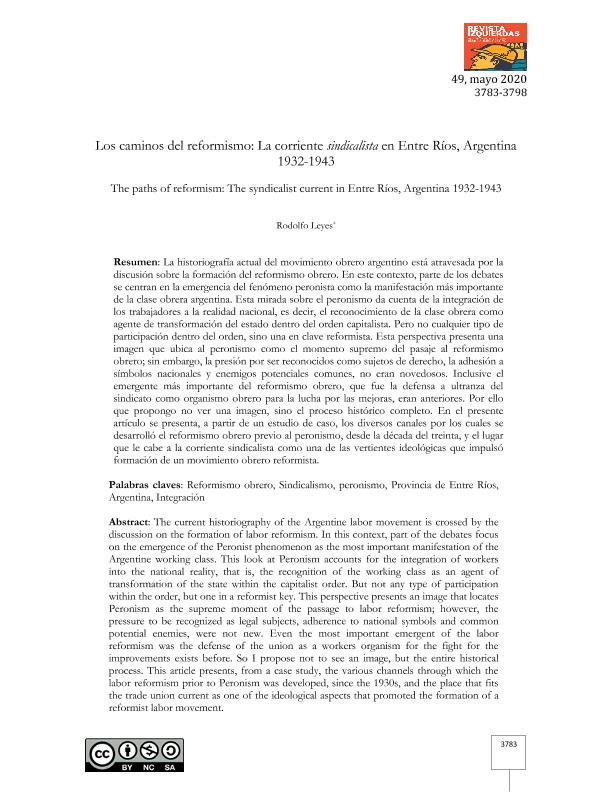Mostrar el registro sencillo del ítem
dc.contributor.author
Leyes, Rodolfo Matías

dc.date.available
2022-09-14T18:40:48Z
dc.date.issued
2020-05
dc.identifier.citation
Leyes, Rodolfo Matías; Los caminos del reformismo: La corriente sindicalista en Entre Ríos, Argentina 1932-1943; Ariadna Ediciones; Izquierdas; 49; 5-2020; 3783-3798
dc.identifier.issn
0718-5049
dc.identifier.uri
http://hdl.handle.net/11336/168762
dc.description.abstract
La historiografía actual del movimiento obrero argentino está atravesada por la discusión sobre la formación del reformismo obrero. En este contexto, parte de los debates se centran en la emergencia del fenómeno peronista como la manifestación más importante de la clase obrera argentina. Esta mirada sobre el peronismo da cuenta de la integración de los trabajadores a la realidad nacional, es decir, el reconocimiento de la clase obrera como agente de transformación del estado dentro del orden capitalista. Pero no cualquier tipo de participación dentro del orden, sino una en clave reformista. Esta perspectiva presenta una imagen que ubica al peronismo como el momento supremo del pasaje al reformismo obrero; sin embargo, la presión por ser reconocidos como sujetos de derecho, la adhesión a símbolos nacionales y enemigos potenciales comunes, no eran novedosos. Inclusive el emergente más importante del reformismo obrero, que fue la defensa a ultranza del sindicato como organismo obrero para la lucha por las mejoras, eran anteriores. Por ello que propongo no ver una imagen, sino el proceso histórico completo. En el presente artículo se presenta, a partir de un estudio de caso, los diversos canales por los cuales se desarrolló el reformismo obrero previo al peronismo, desde la década del treinta, y el lugar que le cabe a la corriente sindicalista como una de las vertientes ideológicas que impulsó formación de un movimiento obrero reformista.
dc.description.abstract
The current historiography of the Argentine labor movement is crossed by the discussion on the formation of labor reformism. In this context, part of the debates focus on the emergence of the Peronist phenomenon as the most important manifestation of the Argentine working class. This look at Peronism accounts for the integration of workers into the national reality, that is, the recognition of the working class as an agent of transformation of the state within the capitalist order. But not any type of participation within the order, but one in a reformist key. This perspective presents an image that locates Peronism as the supreme moment of the passage to labor reformism; however, the pressure to be recognized as legal subjects, adherence to national symbols and common potential enemies, were not new. Even the most important emergent of the labor reformism was the defense of the union as a workers organism for the fight for the improvements exists before. So I propose not to see an image, but the entire historical process. This article presents, from a case study, the various channels through which the labor reformism prior to Peronism was developed, since the 1930s, and the place that fits the trade union current as one of the ideological aspects that promoted the formation of a reformist labor movement.
dc.format
application/pdf
dc.language.iso
spa
dc.publisher
Ariadna Ediciones
dc.rights
info:eu-repo/semantics/openAccess
dc.rights.uri
https://creativecommons.org/licenses/by-nc-sa/2.5/ar/
dc.subject
Reformismo obrero
dc.subject
Sindicalismo
dc.subject
Peronismo
dc.subject
Provincia de Entre Ríos
dc.subject.classification
Historia

dc.subject.classification
Historia y Arqueología

dc.subject.classification
HUMANIDADES

dc.title
Los caminos del reformismo: La corriente sindicalista en Entre Ríos, Argentina 1932-1943
dc.title
The paths of reformism: The syndicalist current in Entre Ríos, Argentina 1932-1943
dc.type
info:eu-repo/semantics/article
dc.type
info:ar-repo/semantics/artículo
dc.type
info:eu-repo/semantics/publishedVersion
dc.date.updated
2022-09-14T14:17:36Z
dc.journal.number
49
dc.journal.pagination
3783-3798
dc.journal.pais
Chile

dc.journal.ciudad
Santiago de Chile
dc.description.fil
Fil: Leyes, Rodolfo Matías. Consejo Nacional de Investigaciones Científicas y Técnicas; Argentina. Universidad Autónoma de Entre Ríos; Argentina
dc.journal.title
Izquierdas
dc.relation.alternativeid
info:eu-repo/semantics/altIdentifier/url/http://izquierdas.cl/ediciones/2020/numero-49
Archivos asociados
